Inventing the Macomber Turnip
Posted on May 29, 2025 by Jenny ONeill
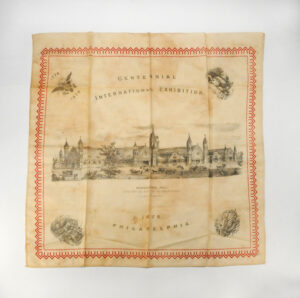
A souvenir handkerchief from the Philadelphia Centennial Exposition 1876. eatures a central illustration of the Agricultural Hall, one of the exhibition’s main buildings, surrounded by decorative elements, including dates and the name of the city. The text reads “Centennial International Exhibition. Agricultural Hall. Philadelphia. 1876”.
This commemorative handkerchief from the Philadelphia Centennial Exposition depicts the source of seeds that created Westport’s Macomber turnip.
Westport can lay claim to its very own vegetable, the Macomber turnip. In 1876 Adin (1845-1915) and Elihu Macomber (1846-1933) ventured to the Philadelphia Centennial Exposition where they procured some seeds.
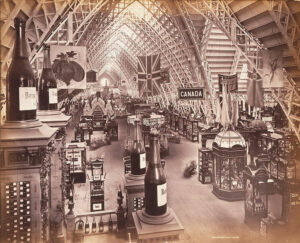
Philadelphia Centennial Exposition agricultural hall
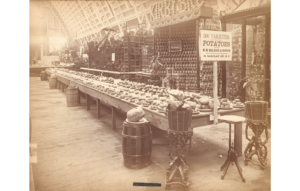
Philadelphia Centennial Exposition Bliss, B.K. & Sons, Seedsmen, 34 Barclay Street, New York, N.Y., Exhibit #36; Holbrook, Edward, Louisville, Ky., Exhibit #45, Agricultural Hall, Bldg. In foreground is a long table filled with potatoes and barrels around it. In the background is a stack of canned tomatoes and a tobacco exhibit.
The brothers planted the seed on their farm located at 1678 Main Road, their experiment brought about the cross-pollination of the rutabagas with radishes, creating an exceptionally mild and sweet turnip. The turnip has been grown almost exclusively in Westport and neighboring towns. Seed stock survived for 150 years thanks to local farmers who saved and carefully guarded the seed. In recent years it has been listed in a seed catalog.
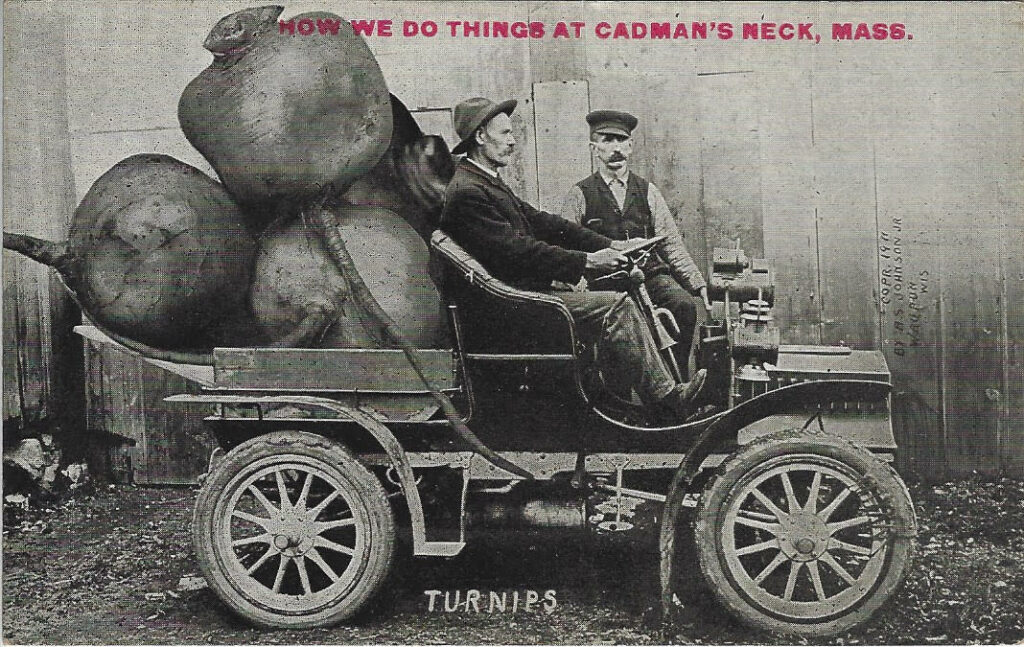
Local turnip lore
The Macomber turnip is sweeter than other varieties.
“Westport soil contains certain minerals that make the Macomber turnip even sweeter than the same vegetable grown in Little Compton or Dartmouth.”
“Be patient, and “wait ‘til they’ve been hit by three frosts” to get the best flavor.”
“Test toe PH, 5 to 7 PH is good for turnip growing”
“If you have sour ground, you can’t raise turnips”
“Use an old sod meadow-field that is run down. One that grass won’t even grow on. The older the better.”
“Macomber turnips will not grow in Little Compton”
“Macomber turnips will only grow over the Massachusetts line.”
Did a farmer pull a gun on a trespasser in his field who had been intent on smuggling seed?
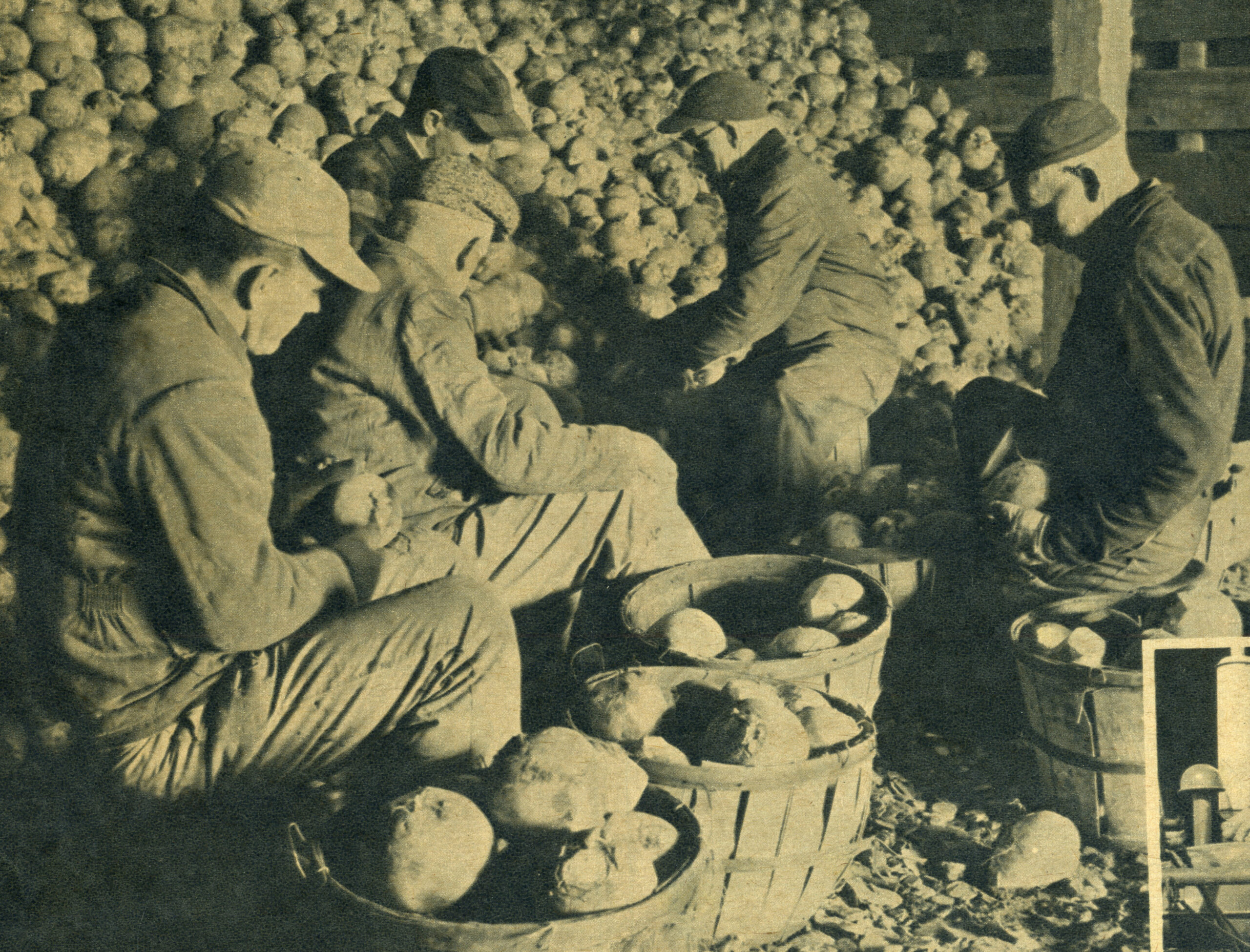
Smith brothers of Long Acres Farm
Past local growers:
Bob Motha (Dartmouth)
Jim Hancock
Boan Farm, Hix Bridge Road
Russell Davis, Sanford Road
Smith family, Hix Bridge Road
Bob Pierce, Berry Hill Farm
Santos, Cabral, Silva families along Route 177
Costa Farm, Main Road
Medeiros farm, Sodom Road
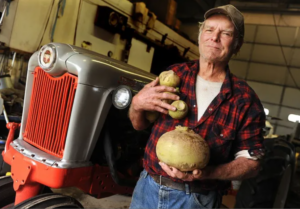
George Smith, Noquochoke Orchards
Current growers:
Paul Manchester
George Smith, Noquochoke Orchards
Bob Peckham, Golden Robin
Bill Braun, Ivory Silo
Shirley and Ted Robbins, Paradise Hill Farm
Bob and Hannah Wolbach, Skinny Dip Farms
How to eat the turnip?
Boiled and mashed with butter
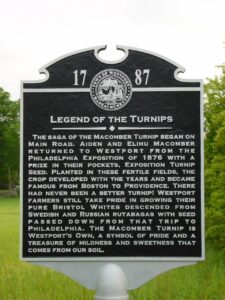
Historic Marker on Main Road
Additional information provided by Bob Russell:
In the 20th century, well known sources of the Macomber Turnip include the following:
- Smith Family, Hixbridge Road, Westport. The Smith Family Farm grew Macomber Turnips commercially and in the 1930’s the farm was cited at one of the most profitable farms in Massachusetts. The farm was sold to the Russell Family in 1982 and is now the Westport Rivers Vineyard and Winery. Bob Smith, one of the former owners of the farm, remained a source of the seed and shared it with Rob Russell.
- Russell Davis of Sanford Road, Westport. Mr. Davis reportedly got his first Macomber seed from John Breault of Dartmouth in 1940, and George Smith plus others getting the seed from John Breault. Today, the Seed Savers Exchange of Iowa lists Russell Davis as the source of the seeds that they have.
- Motha Family, Barney’s Joy, Dartmouth. Marvin Grain store of Cove Street, Dartmouth is the single local known source of the Macomber Turnip. It sells the seed for $2.25 per teaspoon. The store credits the Motha Family as the original source of the seed they sell.
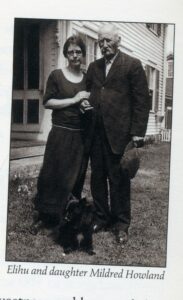
Elihu and daughter Mildred Howland (from the publication Out of the Earth)
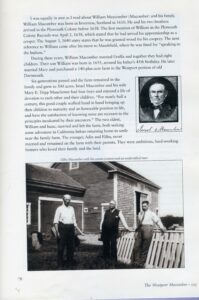
Elihu Macomber (left) (from the publication Out of the Earth)
